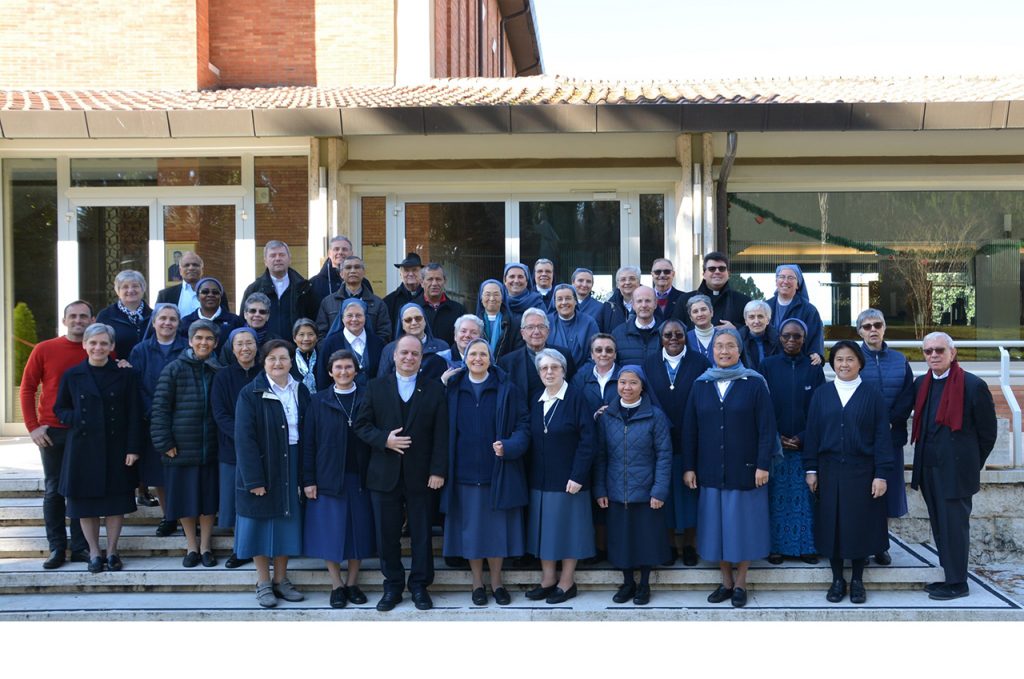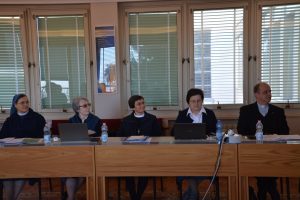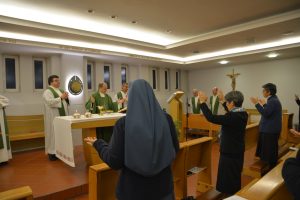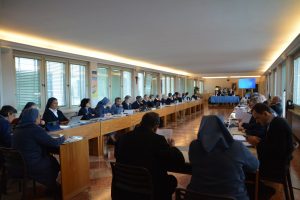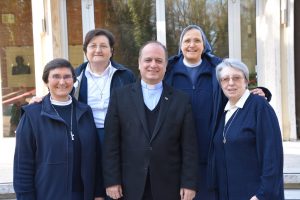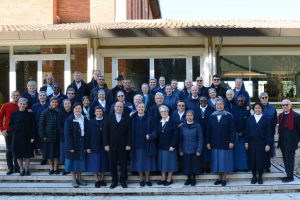XXXVII MEETING OF THE GENERAL GOVERNMENTS OF THE PAULINE FAMILY
THE LAITY IN THE PAULINE FAMILY FOR THE MISSION
THE PAULINE COOPERATORS
Dear brothers and sisters of the Pauline Family,
At the end of the now traditional annual meeting of our General Governments, we would like to share with you some of the “lights” we received in these days, lived in an atmosphere of joy and fraternity, having at heart the growth of our Family spirit. We felt that you were all here with us in some way, but in particular we felt the precious presence of you Pauline Cooperators, who were the center of our reflections. The celebration of your Centenary of Foundation in 2017-2018 helped the whole Pauline Family experience the great vitality that comes from the laity who have recognized and embraced in their lives the charism transmitted to us by Blessed James Alberione, and it made us understand the urgency of “revisiting” this vocation, which enriches our variegated Family in a unique way.
In our work, we were guided with great wisdom by the Intercongregational Commission of the Pauline Family, whom we thank for the preparation of these days and the ability to actively involve all those present.
Fr. Valdir José De Castro, Superior General of the Society of St. Paul, reproposed to us a provocation from Pope Francis who, in a letter to Cardinal Marc Ouellet on the theme of the commitment of the laity in public life, wrote: “It is the ‘hour of the laity’ but it seems like the clock has stopped.” We allowed ourselves to be seriously interrogated about the truth of this statement in our reality as a Family and, in a climate of revision, openness and project-planning, we recognized a call to a “conversion” that requires concrete steps in the direction of valuing the laity in our Family, in the Church and in today’s world, in harmony with the thought of our common Founder.
Our reflection in these days was in continuity with a journey launched in 1988 and that for 3 years brought our General Governments together to address the theme of the laity in our Family. Sr. Maria Paola Mancini, pddm, who personally participated in these meetings, told us about them with passion. We also celebrated the memory of the charismatic history of the Pauline Cooperators through the contribution of Fr. Giancarlo Rocca, ssp.
On the path we traveled, we returned to our biblical roots by meeting the Apostle Paul and his collaborators, introduced to us by Fr. Romano Penna, one of the major experts of St. Paul in Italy. “In his apostolic activity,” Fr. Penna said, “Paul never proceeded alone! […] Given the variety and richness of the contribution of Paul’s companions to his mission, it is clear that they played an important role in his activities. Even the Pauline letters were not entirely individual undertakings. In reality, these missionaries deserve great attention. It does not detract from the Apostle’s greatness to highlight those with whom he carried out his ministry–those whom he loved to praise and call his collaborators.”
It is always Paul who offers us the vision of an ecclesiology of communion, which gives high importance to the common call to holiness, perfectly in line with that proposed not only by Vatican Council II, but also by Pope Francis: “In virtue of their baptism, all the members of the People of God have become missionary disciples (cf. Mt. 28:19). All the baptized, whatever their position in the Church or their level of instruction in the faith, are agents of evangelization. It would be insufficient to envisage a plan of evangelization to be carried out by professionals while the rest of the faithful would simply be passive recipients. The new evangelization calls for personal involvement on the part of each of the baptized” (EG 120).
Valuable companions on our journey, who recounted a number of experiences concerning how some lay people share the charism of a Religious Family, were Nunzia Boccia of the Murialdo Family, Donatella Acerbi of the Pallottine Family and Antonio Boccia of the Salesian Cooperators, along with the presence of the Delegates of our Pauline Cooperators from different countries: Fr. Guido Colombo, ssp, and Sr. Pina Riccieri, fsp, from Italy; Sr. Virginie Kiz-Kasong, pddm, from Congo; Sr. Maria de los Angeles Sejio, sjbp, from Argentina, and the contribution of Sr. Ninfa Becker, fsp, from Brazil. It was enriching and challenging to listen not only to their experiences but also to the expectations and suggestions drawn up by the groups of Cooperators themselves, so as to live in a fuller and more mature way their belonging to our “admirable Pauline Family.”
A further “ally” on this journey was Canon Law, which, through the help of Fr. Priamo Etzi, ofm, provided us with a clear map of the direction to follow to enhance a sharing of the charism–recognized as the unifying center of the Pauline Family–by asking us to stop and redefine the mode of relationship between its different branches, and in particular to rethink the relationship between its Religious Institutes and Lay Association (the Cooperators).
All this lead us to acknowledge the urgency of making a significant “passage”: that of clarifying the identity of the Pauline Cooperators on the charismatic, institutional and organizational levels, also in view of a fresh drafting of its Statute so as to take into account the journey made so far in the Church and in our Family. To this end, it will be necessary to initiate a process that we intend to live in a synodal style.
We are aware that it is above all a matter of acquiring a mentality that will lead all of us–religious and laity–to think, pray, form ourselves and carry out the mission TOGETHER, side by side, placing our common charism at the center and making the most of–not nullifying–the specific features of each of our realities and therefore of our different vocations. Great value can be given to what is already silently growing and waiting to be recognized.
Naturally there is a whole path to follow, but as the Spanish poet Antonio Machado says: “Traveler, there is no path; the path is made by walking.” Or to put it in the words of Pope Francis, it means “initiating processes, rather than occupying space. God manifests himself in time and is present in the processes of history. This means giving priority to actions that generate new dynamics. And this requires patience, waiting.”
So, together with you, let us continue to take one step after another, with a gaze that dares to look well ahead!
Ariccia, 13 January 2020
THE PARTICIPANTS IN THE
XXXVII MEETING OF THE GENERAL GOVERNMENTS
OF THE PAULINE FAMILY

